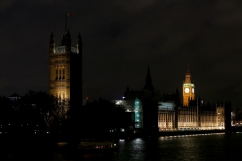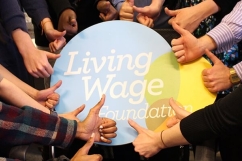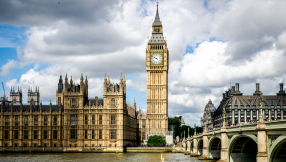It's reported that a 'government advisor' recently brushed off the advice given by the Church of England's bishops by saying, "We don't give a s*** about the bishops."
Whether you think this is fair comment or not, it highlights a problem that we've got in the Church. 60 years ago, we'd still have been taken fairly seriously by the government as well as the media and the rest of the Establishment.
Now, although the Church of England remains established by law, and in spite of growing church attendances in parts of the country and the extraordinary amount of public services they offer, we are firmly in post-Christendom.
This means we don't have the ear of the government any more, by right. Justin Welby admitted as much in a recent Radio Four documentary, suggesting that the days when the Archbishop of Canterbury would stroll across the river from Lambeth Palace to Downing Street to think through policy with the Prime Minister over a glass of whiskey are long gone.
So when this week a group of churches came out with a stinging attack on the government's welfare reforms, you can imagine the response in Whitehall...
The Church of Scotland, Scottish Episcopal Church, the Methodist Church, Quakers, the United Reformed Church and Church Action on Poverty lined up to denounce the direction in which the welfare reforms are taking the country. They say, "The Welfare Reform and Work Bill will make poor people poorer. This will happen through a large reduction in benefits. The government has not assessed how families will be able to cope on incomes that are greatly reduced. The hardship caused is likely to be substantial."
My aim here isn't to assess this argument (but it is worth reading the whole report to see the challenge to the Department for Work and Pensions). Instead, it's helpful to look at how effective these types of interventions are from the Church.
In an age where we no longer have the 'right' to be heard in public discourse, claims that the Church makes on influencing policy can't just be based on numbers. The number of people attending church regularly in the UK is not high (7.6 million people attend at least monthly). While this means we are still the biggest civil society movement in the UK, the view that this should automatically grant us a 'seat at the table' is no longer accepted.
What does gain us the credibility to speak into public debate is what we do with the resources at our disposal. And by any measure, the Church is punching well above its weight. Research last year from Theos suggests, "10 million adults in the England say that they or a close member of their family have used church or church based community services in the last year excluding weddings, baptisms and funerals." That is an awful lot of people and outstrips any other voluntary organisation many times over.

The sheer amount of volunteer hours being offered and great work being done by churchgoers across the country means that our leaders have not only the right but the duty to speak out about what they see on the ground.
In many places, as the state has retreated, the Church is the last bastion of help for many in precarious social situations. If the Trussell Trust has been a thorn in the side of the government, that's because the volunteers and staff at its large network of food banks spend many hours every week dealing with people who are at the sharp end of decisions being made by central and local government, by employers and banks, by payday lenders and credit card companies.
The bishops in the Church of England may look aloof and out of touch when they speak in the House of Lords in their episcopal finery. But actually, they are in touch with large numbers of deprived people through the parish system, which despite being overstretched and under-resourced, still covers every blade of grass in England. Bishops meet with countless ordinary Christians doing unsung yet heroic work in deprived and diverse corners of our cities and countryside. That's before we even consider all the other denominations.
So the basis on which we critique is well founded. The Church is a vast net contributor to the public good in this country and can legitimately attack government policy (and indeed praise it, as the Bishop's Pastoral Letter prior to the General Election was careful to do, although much of that nuance was missed by ministers and the media).
But the Church mustn't stop at criticism and good works. If we are to truly gain credibility and really show where current thinking is deficient, we must provide an alternative vision, backed up by action.
This is the task of much of the Christian Social Teaching that has been coming back into fashion since the financial crash. Catholic Social Teaching has re-entered the fray as a vital treasury which accepts neither the narrative of exploitative capitalism or dehumanising big state socialism. Theologian Anna Rowlands is soon to publish a new primer on Catholic Social Teaching, while experienced commentator Clifford Longley has written a guide for how Catholic Social Teaching may help us out of the mess we're currently in.
There have been other contributions to this theological renewal. A collection on Anglican Social Theology was recently published. Meanwhile more charismatic evangelical groups such as Newfrontiers are beginning to think through their contribution to communities through Jubilee Plus – their social transformation arm.
But as well as documents, conferences and critiques of policy, there is a need for action which points to alternatives. The paradigm example is the Living Wage. This week is Living Wage Week – a week to celebrate the ground breaking campaign which began in churches and has seen hundreds of millions of pounds won for ordinary families struggling with poverty pay.

Another example is the campaign against exploitative lending. The Archbishop of Canterbury was at the forefront of calls to regulate payday lenders properly. But he recognised that criticism alone wasn't sufficient. He has since been at the heart of a major campaign to see churches help the community finance sector provide local ethical alternatives to the vampiric payday lenders.
There are many more examples of radical alternatives being incubated and spread by churches and Christian groups. Think of the critical role churches are playing in the response to the refugee crisis, in response to homelessness and in response to the chronic unemployment issues among young people.
Critique and protest will always be part of our prophetic calling as a Church. But in the 21<sup>st Century we need to provide alternatives – showing that the Kingdom of God is endlessly creative, infinitely just and profoundly radical. This means we not only get a credible hearing in the plural 21<sup>st Century marketplace of ideas but ensures that those Kingdom values are being lived out afresh in a new generation.















